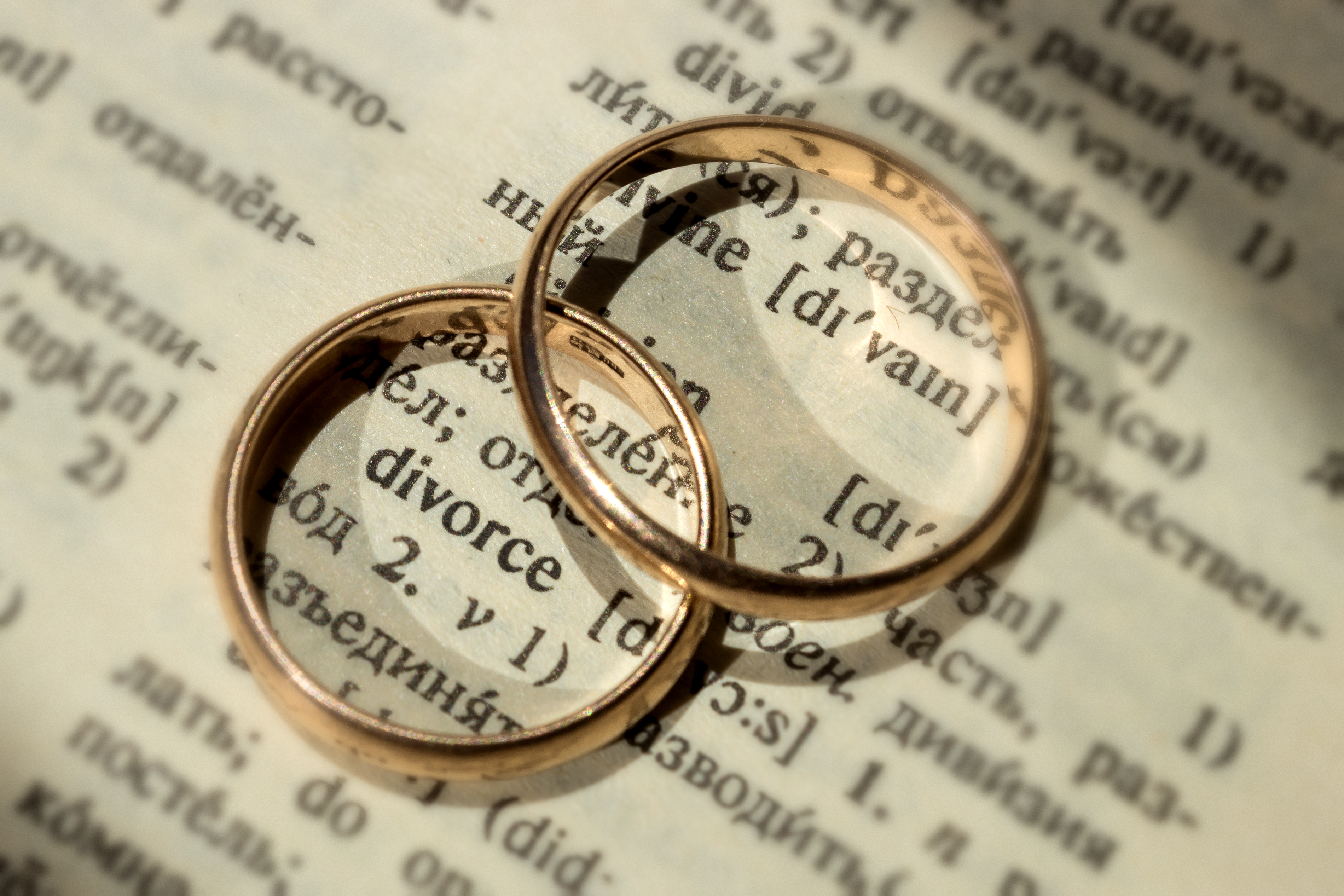A very modern divorce: Why amicable divorces are on the rise
Isn't it about time we reframed our view of divorce?


Celebrity news, beauty, fashion advice, and fascinating features, delivered straight to your inbox!
You are now subscribed
Your newsletter sign-up was successful
Isn't it about time we reframed our view of divorce?
When Gwyneth Paltrow and Chris Martin announced they were “consciously uncoupling” in the spring of 2014, everybody laughed. The mockery was so fervent, in fact, Gwyneth confessed years later that it had caused her to retreat in embarrassment. “The intensity of the response saw me bury my head in the sand deeper than I ever had in my very public life,” she wrote in a 2020 essay for Vogue. But when you really consider the phrase; when you boil it down to its purest form, what on earth were we ridiculing?
As a society, we’re comfortable with the narrative of a “messy” divorce. We hear the word divorce, and instantly project images in our minds of starched suits, tear-stained papers peppering protracted board tables, and bitter pledges from one party to take the other for “all they’ve got”. The thing is, divorce doesn’t always have to be like that - and it seems the public mindset is slowly changing to think that way.

When Kate Daly got divorced in 2012, she was one of 118,140 couples in England and Wales doing the same. Hers, she declares, was a “train wreck”. “It was antagonistic from the start, and the minute lawyers got involved - because we both involved lawyers fairly early on - that level of antagonism just ratcheted up,” she recalls.
Marriage is a legal contract; so extracting yourself from it is a legal process, too. But something that’s perhaps not widely enough understood is that there’s actually no requirement for couples to instruct lawyers in order to get a divorce. As long as both parties agree they want a divorce - and can settle on the reason why - you don’t need legal representation. Despite this, the majority of divorcing couples do seek out individual representation - whether due to an assumption that it’s the done thing, or feeling daunted at the prospect of decoding legal jargon and process. Kate and her ex-husband did just this, and collectively spent more than £80,000 on legal fees. By spending so much on fighting one another about who was going to have what, they had less money in the pot when it came to re-housing themselves.
The cumulative cost of divorce for the public purse in this country is gigantic; estimated to be around £51 billion. That’s due, among other things, to lost work days as a result of stress and poor mental health, a surplus of benefits for separated families with lesser income, and additional policing when things get nasty. But it’s not just the financial element of a ‘messy’ divorce that can take its toll - there’s the emotional burden, too. Kate tells me she emerged from the long, dark divorce process feeling “bruised”.

“We have an adversarial legal system, which means there are two sides, and the parties battle it out. One wins and effectively one loses,” she says. That dynamic “cuts off any good will between you at the knees.” For Kate, having everything “go through a third party who doesn't care about your long history” left her “paralysed and unable to communicate or even think for myself.”
Celebrity news, beauty, fashion advice, and fascinating features, delivered straight to your inbox!
30-year-old Sarah’s divorce couldn’t have been more different. After eight years together - almost four married - she decided it was time to part ways with her husband, Seb*. The relationship had started out as “thrilling and passionate” - it was “all very exciting,” she tells me. And it continued that way; when the couple decided to get married, they told no-one, instead gathering friends and family under false pretences and surprising them all with a wedding ceremony.
"One wins and effectively one loses"
But as the years played out and they became parents, Sarah and Seb grew apart. “I think you're often a different person at the end of your twenties than you are at the beginning. Fundamentally, our view on things and the way we approached things was really incompatible,” Sarah reflects. Having their daughter was the “trigger” she needed to question their relationship. “I started to almost see through her eyes. I’d think, ‘Would I want this for her when she grows up?’” The answer was a resounding no.
The niggling cracks in the relationship saw the couple deal with it in very different ways; while Sarah sought support from her partner, Seb found comfort elsewhere. As his indiscretions grew more frequent, Sarah was forced to admit that they could no longer continue as husband and wife. But after telling Seb that she wanted a divorce, she felt surprisingly at peace. “When I took the decision to walk away, it was quite an empowering thing,” she says. “I’d been mulling it over and in angst about it for quite a long time, so I’d done the hard bit of dealing with all the hurt and pain.”

The news came as an initial shock to Seb, but he was “surprisingly supportive” of Sarah’s decision - whether through guilt over his infidelities or anything else. From then on, what ensued was a “very amicable and peaceful” divorce. There were no explicit conversations in which the former couple decided to take a harmonious approach - only a shared intention to make their separation as easy as possible for their daughter - and Sarah still contemplates whether it was “just luck” that it turned out this way.
Sarah and Seb’s situation was helped by the fact that their assets were easily split - they owned two houses, having recently moved areas, so they took one each. Seb looked after the proceedings of the divorce, opting to do it together rather than instructing separate lawyers, and they seamlessly agreed on the other important details: They allocated an even amount of time each with their daughter, and split the nursery fees down the middle. It was as clean a break as you’d get from a guillotine.
“We completely separated the legal side of the divorce to the conversations that were happening between us"
Not every couple’s separation comes so easily. It’s rare for circumstances to align so neatly, and it can be hard not to allow acrimony to creep in, particularly where hurt is involved (which it usually is, where breakups are concerned). But perhaps Sarah and Seb’s amicable split wasn’t just good fortune at play - maybe it lay in their subconscious decision making, too.
“We completely separated the paperwork and the legal side of the divorce to the conversations that were happening between us,” Sarah explains. “We agreed that we knew where we were emotionally with it. I’d dealt with a lot of the hurt and the pain from the infidelity throughout the course of the relationship, so the legal stuff was literally just a tick box exercise.”

Kate Daly believes this ability to compartmentalise is fundamental to a civil divorce. After emerging somewhat blemished from her own separation, she decided “there had to be a better way” of doing it. And so, she co-founded Amicable. A lawyer-free divorce service intended for splitting couples to navigate together, it’s cheaper (costing a fixed rate of just under £3,000, as opposed to the average cost of a UK divorce, which is just shy of £15,000) and has a particular focus on helping both parties to emotionally prepare themselves for unpicking their shared life.
“We coach people through the emotional journey, because you can make some really crummy decisions when you're feeling terrified, or feeling like your back is against the wall,” says Kate. “If you're the person who's been left, for example, you can feel that you should get more, and that you're entitled not to have your life disrupted because it wasn't your decision. But that's not a reasonable stance to take when it comes to sorting out your finances,” she explains. “So helping people work through that kind of anger before they come anywhere near negotiating their financial outcomes is something that we have found helps people come out with a better settlement.”
With the company boasting a 95% success rate in untying the knot amicably, perhaps the proof is in the pudding.

It’s all well and good hoping for a harmonious divorce, but the current legal system in the UK doesn’t necessarily set the landscape for that. As it stands, one party must apply for divorce on one of five grounds: adultery, unreasonable behaviour, desertion, having lived apart for more than two years if both agree to the divorce; or having lived apart for at least five years if they don’t. This fault-based system paves the way for a blame game, which is known to incite tensions between couples. “Ultimately, unhappiness is not a legally sound reason for the court to grant a divorce,” explains Emma Davies, partner and solicitor in the family team at Nelsons.
"We should be moving away from this idea that a divorce is some kind of failure"
From April 2022, however, there will be a new, no-fault approach to divorce law in England and Wales, which it’s hoped will contribute towards making divorce less combative. “Under the proposed law, one spouse will only have to state that the marriage has broken down irretrievably. The new bill also removes the possibility of contesting the decision to divorce,” says Emma, adding that the intention is to improve legislation that notably “exacerbates conflict and harm to an already fragile relationship.”
With this law might come a change in public perception of divorce, and perhaps it’s about time. Divorce is a practical function: it signals the end of a relationship that once worked, but doesn’t now. It doesn’t need to signal additional pain and suffering. There are exceptions where it goes deeper than that, of course - abusive relationships being just one - but if we could remove some of the associated acrimony from divorce by reframing it in our minds as a society, couldn’t we prevent a lot of unnecessary, prolonged heartache?

“We're trying to change the narrative around divorce,” says Amicable’s Kate. “We should be moving away from this idea that a divorce is some kind of failure. We are living longer, so the likelihood of having just one serious, long-term relationship in your lifetime is now very slim. It’s normal for people to have multiple relationships, and if they don't work out after a period of time, they're not necessarily a failure.”
Sarah certainly feels this way. “The default reaction when I talk about my divorce is, ‘Oh, I'm so sorry this happened to you, it’s just awful.’ But I find that really jarring. I’ve decided that my divorce is a good thing, and I so deeply believe it's a good thing.”
Divorce, when amicable, can be empowering. It’s acknowledging that something may have been right at the time, but it isn’t now - and it’s taking a necessary step towards positive change. So sure, you can laugh at Gwyneth Paltrow and Chris Martin’s pretentious phrasing - but maybe they had it right with conscious uncoupling all along.
*Name has been changed
Cat is a Senior Editor at Marie Claire, covering news and features across the brand's key purpose pillars, including women's issues, politics, career, mental health, female empowerment and equality, as well as books.
